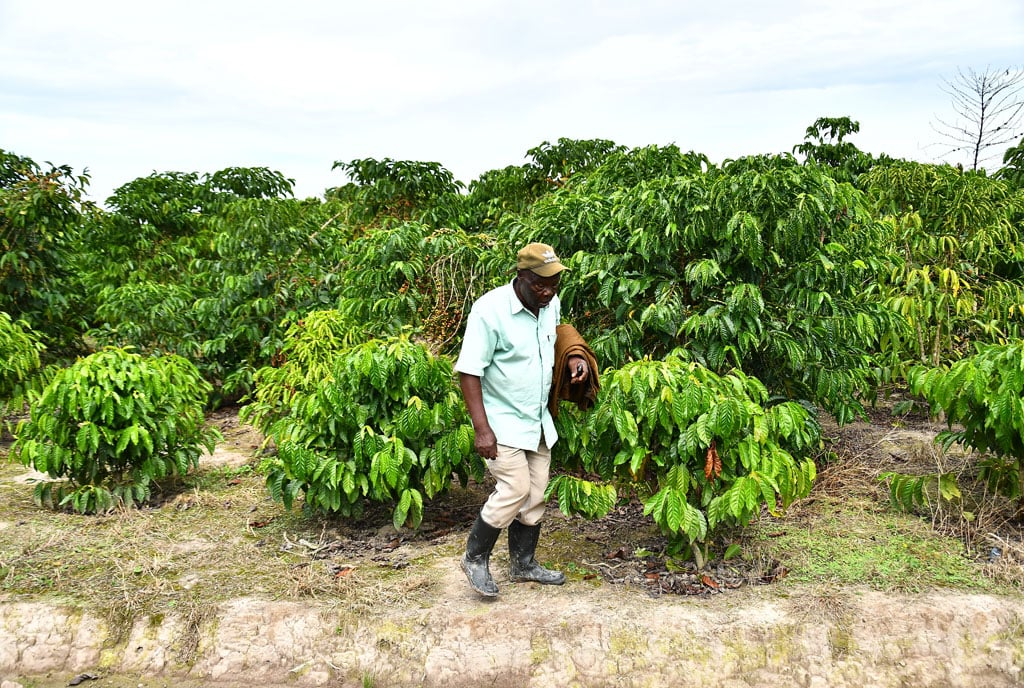Busoga kingdom rallies coffee farmers to register ahead of EU deadline

A coffee farmer is seen in his garden in Kyotera District on May 20, 2024. PHOTO/MICHEAL KAKUMIRIZI
What you need to know:
- The District Natural Resources Officer, Mr Robert Isabirye, urged farmers to adopt sustainable coffee production practices to ensure the long-term viability of the sector.
The prince (Issabalangira) of Bugabula chiefdom in Busoga Kingdom, Mr Moses Woira Mitala Kitimbo, has urged coffee farmers in Kamuli District to embrace the ongoing coffee registration exercise, which seeks to comply with European Union guidelines on exports.
Uganda has up to December 30 to comply with the European Union Deforestation Regulation (EUDR), which, among others, stipulates that farmers must prove that their coffee has not been grown on land where deforestation has taken place.
Speaking during a stakeholder engagement at the Kamuli Youth Centre on Tuesday, Mr Kitimbo said registration will boost Uganda’s coffee exports and improve the quality and traceability of their produce.
He dispelled reports that the coffee registration exercise is linked to taxes.
“Please embrace this process because it’s for your own benefit. Government needs to know you so they can plan for you better,” he said.
Mr Kitimbo also warned farmers against harvesting unripe beans, which, he said, could compromise the quality of Ugandan coffee on the international market.
More than 400 coffee farmers and representatives of coffee farmers’ organisations were in attendance.
The Kamuli Chief Administrative Officer, Mr Badru Ssentongo, commended the Uganda Coffee Development Authority (UCDA) and the Kamuli Coffee Development Farmers Association for their efforts in engaging with local farmers over the exercise.
Mr Michael Baguma, the UCDA extension worker for Kamuli and Buyende, said the meeting sought to sensitise farmers about the benefits of registration, which is crucial for maintaining access to the EU market. The EU is the largest consumer of Ugandan coffee.
Mr Israel Ssebugenyi, the UCDA facilitator, emphasised that coffee registration is not pegged on taxes but rather intended to secure markets for farmers and ensure traceability.
“The registration process, which is free for farmers, will involve capturing GPS locations of every farm and providing farmers with unique codes to ensure traceability,” he said.
He warned farmers that Uganda has about three months to comply with the EUDR regulations, noting that failure to register would result in losing 70 percent of the market share and a drastic fall in coffee prices.
He announced to Kamuli farmers that the registration exercise would be conducted by a private company, Pula, on behalf of UCDA. He also urged farmers to cooperate with the registration process and become ambassadors to ensure compliance.
The District Natural Resources Officer, Mr Robert Isabirye, urged farmers to adopt sustainable coffee production practices to ensure the long-term viability of the sector.
Mr Zubair Mukaya, a coffee farmer in Nangodo, wondered whether the registration process would be accessible to all farmers, especially those in remote areas with limited access to technology and resources. He also wondered how the GPS location tracking would work, given the varying sizes and locations of coffee farms in the region.
Mr Mukaya’s concerns were echoed by other farmers in attendance, who also sought clarification on the registration process and its benefits. UCDA officials assured them that the teams would be sent to farms to conduct the registration and GPS tracking.



